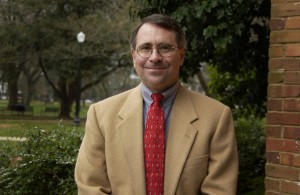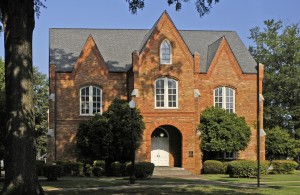TUSCALOOSA, Ala. — Ten years ago, faculty members in The University of Alabama’s College of Arts and Sciences carved out a home for exceptional students, broad-minded professors and small, seminar-style classes that dared to cross intellectual boundaries. That niche, called the Blount Undergraduate Initiative, still draws curious students and dedicated faculty to an intense living-and-learning environment starting with the freshman year.
“You get to have sustained intellectual conversations with students in ways you certainly wouldn’t have if you were teaching a typical freshman class,” says Dr. Joe Hornsby, director of the Blount Initiative and UA professor of English.

The Blount Undergraduate Initiative brings in nearly 100 students a year for a four-year program that focuses on seminar instruction. Students typically major in one or more fields in the College of Arts and Sciences and other colleges while they also follow a specialized curriculum that includes seminars, discussion groups, special presentations and activities.
Freshmen stay together in the Living-Learning Center, which serves both as dorm and classroom facility. Upper classmen take courses at Oliver-Barnard and Tuomey halls in the center of campus. Graduates go on to a range of careers and fields.
“Our graduates have gone in all sorts of different directions,” Hornsby says. “They go to med school, they’ve gotten their MBAs, two or three finished their B.A. and returned to get a second or third B.A. in something else. They’ve also gotten graduate degrees in English or history or psychology.”
The program arose from an effort that began in 1993. Dr. James D. Yarbrough, then dean of the College of Arts and Sciences, and other faculty and staff members wanted to encourage the best students in the state to stay in Alabama for their education.
The Blount Foundation, led by Winton and Carolyn Blount, gave a $7 million endowment to start the initiative; family and friends of John T. Oliver also gave $1 million for the renovation of the John T. Oliver-Barnard Academic House. Hornsby was part of the group that planned the initiative, starting in 1997. He took over as director in 2000.
“It started out as an undergraduate initiative – a way to get a series of seminars for students and a way for faculty to turn their research interests into seminars,” Hornsby says. “The freshman component came into being after we had received the endowment from Blount. We realized we were going to be able to offer a larger program with a living component.”
To draw students into the program, the University sent out fliers and other information to students and guidance counselors throughout the state. Robin Preussel was one student the message reached. Preussel was a top senior at Grissom High School in Huntsville.
“It was something that college services had encouraged those of us taking AP classes to apply for,” Preussel says. “I was looking for a smaller liberal arts college, but the Blount Initiative sounded like the perfect thing for me in a public university,” Preussel says.
Matt Cybulsky found himself in a similar situation; he was first in his class at Vestavia Hills High School, and he was looking for a college where he could grow. Yarbrough himself encouraged him to apply.
“I had a lot of other opportunities go to school out of state, but Dean Yarbrough told me about why he and others had pushed so hard to create this program,” Cybulsky says. “Dean Yarbrough talked about how excited he was, and he changed my mind. Every other school melted away.”
To enter the Blount Initiative, students must first apply, then go through a group interview process. Basically, the program is looking for students who are ready to share ideas.
“We invite all students with strong applications to come on campus and divide them up into groups that simulate the seminar atmosphere,” Hornsby says. “A couple of professors meet with the groups, and it turns into an hour of chatting and the students getting to know one another and batting around ideas. We’re looking at how students interact.”
Hornsby notes that the initiative does not have minimum ACT scores, although many Blount students also are in UA’s Honors College. Basically, the program is looking for students who are ready to share ideas.
“We look at a range of students, Hornsby says. “We have an application that has a creative component to it. We offer an honors-type experience for a broad range of students. We’re looking for students who show a lot of potential, and we try to provide an academic environment that will let them live up to that potential.”
Today, Blount freshman stay together in the Living-Learning Center. But in the first year, 1999, most of the students were housed in the older Parker-Adams Hall on the UA campus, while the new dorm was being built.

“It was good that we weren’t living in a bigger dorm,” Preussel says, “because the smaller space forced us to interact with each other as we not only attended classes, but also lived together that first year.
“We drafted a constitution for the group. We developed various committees regarding homecoming and community outreach. We really became our own little community. We all shared that bond as we developed the program together.”
Plus, the students got a dose of what it was like to read the classics and express what they thought and how they felt about the foundations of science and culture.
“The thing I really, really liked about it was the freedom given to us,” Cybulsky says. “We were given several books to read, and instead of sitting down to take a test, we sat down and talked about the concepts and why it mattered and what it meant to us. The dialog with fellow students and the professor was refreshing.”
Professors enjoy the give-and-take as much as the students. They also get a chance to move beyond their specialties to explore different ideas. The relationship between professors and students extends over the entire four years of the program.
“The freshman courses are designed to start a conversation that is designed to continue throughout the undergraduate career and culminates in the senior seminar, where we read some of the writers we read in excerpt in freshman year,” Hornsby says. “So we continue that conversation in senior year, but we don’t finish it; we hope it continues beyond that. How can we make the world better, or how can we better ourselves? What makes us tick?”
That conversation has sustained Cybulsky and Preussel into their careers. Cybulsky, after earning an MBA, an M.A. in medical ethics and an M.S. in health administration, works for Conifer Health Solutions as director of revenue cycle services; he’s in the process of moving from Dallas to Hilton Head, S.C. He says he’s found philosophical issues in his work that bring back concepts he first encountered in the Blount Initiative.
“I regularly think of books I read in Blount,” Cybulsky says. “I can write. I can speak. People look to me to speak for the company. I find myself arguing philosophical concepts during meetings, because I thirst for this clarity, in large part, due to my training in Blount.”
Preussel, an attorney who’s an associate at Fulbright & Jaworksi LLP in Houston, says Blount helped her prepare for Yale Law School and beyond.
“Blount taught me how to be confident about speaking out in small classes at Yale,” Preussel says. “It gave me the kind of self-assurance and encouragement I needed.”
As part of the 10th anniversary of the program, the Blount Undergraduate Initiative brought Stephen Pinker of Harvard University to Tuscaloosa in November 2009 and plans to bring noted biologist and UA alumnus E.O. Wilson, author of “Sociobiology: The New Synthesis” and “The Superorganism: The Beauty, Elegance, and Strangeness of Insect Societies,” to campus in spring 2010.
UA’s College of Arts and Sciences is the University’s largest division and the largest liberal arts college in the state. Students from the College have won numerous national awards including Rhodes Scholarships, Goldwater Scholarships and memberships on the USA Today Academic All American Team.
Contact
Richard LeComte, 205/348-3782, rllecomte@ur.ua.edu
Source
Dr. Joe Hornsby, 205/348-1730, jhornsby@bama.ua.edu